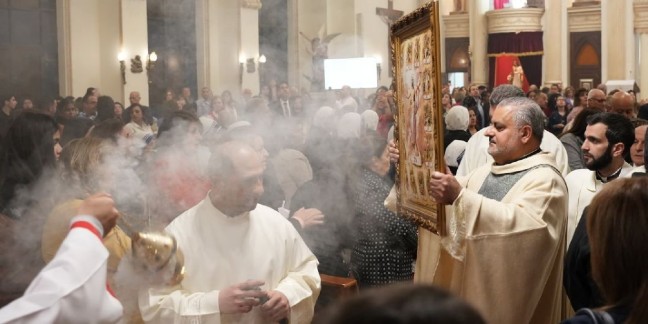 Father Rifat Bader, head of the Catholic Center for Studies and Media in Amman, carries an image of Christ as he concelebrates Easter Mass in Amman, the Jordanian capital, April 16, 2023. Father Bader told OSV News that a Nov. 5, 2023, decision by Jordan's Council of Churches to cancel Christmas festivities amid the ongoing Israel-Hamas war shows "solidarity with the people of Gaza." (OSV News photo/courtesy Catholic Center for Studies and Media in Amman)AMMAN, Jordan — Churches in Jordan are canceling Christmas celebrations in solidarity with Gaza as violence in the Palestinian enclave mounts.
Father Rifat Bader, head of the Catholic Center for Studies and Media in Amman, carries an image of Christ as he concelebrates Easter Mass in Amman, the Jordanian capital, April 16, 2023. Father Bader told OSV News that a Nov. 5, 2023, decision by Jordan's Council of Churches to cancel Christmas festivities amid the ongoing Israel-Hamas war shows "solidarity with the people of Gaza." (OSV News photo/courtesy Catholic Center for Studies and Media in Amman)AMMAN, Jordan — Churches in Jordan are canceling Christmas celebrations in solidarity with Gaza as violence in the Palestinian enclave mounts.
The leaders of Jordan's Council of Churches announced Nov. 5 the cancellation of all festivities and events to express deepening concern over the escalating humanitarian crisis engulfing Palestinian civilians in Gaza.
Viewed as a poignant gesture of respect for the innocent victims and the reverent sacrifices made by those in Gaza and the West Bank, the council has called for a solemn observance of Christmas through prayer and religious rituals. It said that Christmas bazaars, gift distributions for children, decorative initiatives and scout parades would be canceled.
"We canceled the external celebrations of Christmas. The decision was made to focus on the spiritual meaning of Christmas -- the birth of Jesus. It's solidarity with the people of Gaza," Father Rifat Bader told OSV News. He directs the Catholic Center for Studies and Media in the Jordanian capital.
"We will focus only on the religious celebration, including worship services and songs inside the churches and nothing outside the churches," Father Bader explained.
He told OSV News that one of his cousins is a Dominican Sister of the Most Holy Rosary of Jerusalem serving in Holy Family Parish in Gaza and is in constant contact with her. She is one of two Jordanians who along with an Egyptian nun serve the Christian community and ordinary citizens in Gaza City.
"The Rosary Sisters, the Missionaries of Charity founded by St. Teresa of Calcutta, and the Sisters of the Incarnate Word are doing a great, courageous job serving the people of Gaza," Father Bader said.
"They are putting aside their own personal fears in order to take care of the people with whom they are living day and night inside the church. These are heroes in Gaza, and we pray God will protect them in order to continue the Christian presence in Gaza," the priest explained.
Father Bader said Jordanians and Jordan's population of Palestinian descendants "also are suffering together with the people of Gaza. We are the closest country to Palestine, to Gaza, that is why we are not celebrating Christmas with joy this year."
More than 10,000 people have been killed in Gaza since Israel launched its military offensive one month ago, according to the Hamas-controlled Health Ministry. That toll is expected to rise in the coming days as Israeli troops battle Hamas militants in Gaza City's narrow streets and the vast network of tunnels below.
Israel declared war on the Islamist militant group after it carried out brutal attacks Oct. 7, killing 1,400 in southern Israel and kidnapping more than 200 people. News reports since then have put the number of hostages at more than 240.
The United Nations estimates that 1.5 million Palestinians have been internally displaced in Gaza, with many civilians trying to flee southward, but that journey is difficult due to destruction to the roads caused by Israeli bombing. The Israeli military has surrounded northern Gaza -- including the densely populated Gaza City -- as waves of powerful airstrikes continue to bombard the besieged enclave.
"All the Christians in Gaza's Hayy Zeitouna district took a public decision to go to the two churches -- the Latin Catholic Church and the Orthodox Church. The Orthodox Church was attacked," Father Bader explained.
The Greek Orthodox Church of St. Porphyrius sheltered hundreds of Palestinians, mainly Christians, displaced by the war, according to religious officials. The Israeli military strike Oct. 19, killed some 18 people and injured at least 30.
"Those who were in the Orthodox Church came to the Latin Catholic Church and now you find more than 700 people sheltering and sleeping inside the (Holy Family) church. They are living like the first-century Christians sharing everything together," Father Bader said.
Jordan's King Abdullah II has led Arab calls for a ceasefire in the conflict as Palestinian civilian casualties mount. He has long advocated for a two-state solution to the long-standing Israel-Palestinian crisis.
Meeting Arab officials and U.S. Secretary of State Antony Blinken Nov. 4, King Abdullah "reaffirmed that the security or military solution will not succeed in ending the Arab-Israeli struggle," according to Jordanian state TV. The U.S. has asked for brief humanitarian pauses to get aid in, but Israel has refused both.
On Nov. 7, Israeli Prime Minister Benjamin Netanyahu said that Israel would consider "tactical little pauses" in Gaza fighting to facilitate the entry of humanitarian aid or allow the exit of hostages held by Hamas militants.
Meanwhile, the Jordanian Air Force successfully completed an airdrop of badly needed medical supplies Nov. 5 to its field hospital operating under difficult conditions in Gaza.
Israel's blockade and recent siege of Gaza have put some hospitals out of service, and aid deliveries through the Rafah border crossing with Egypt have so far been inadequate, humanitarian agencies report, expressing fears of a collapse of essential services in Gaza.
— Dale Gavlak, OSV News


